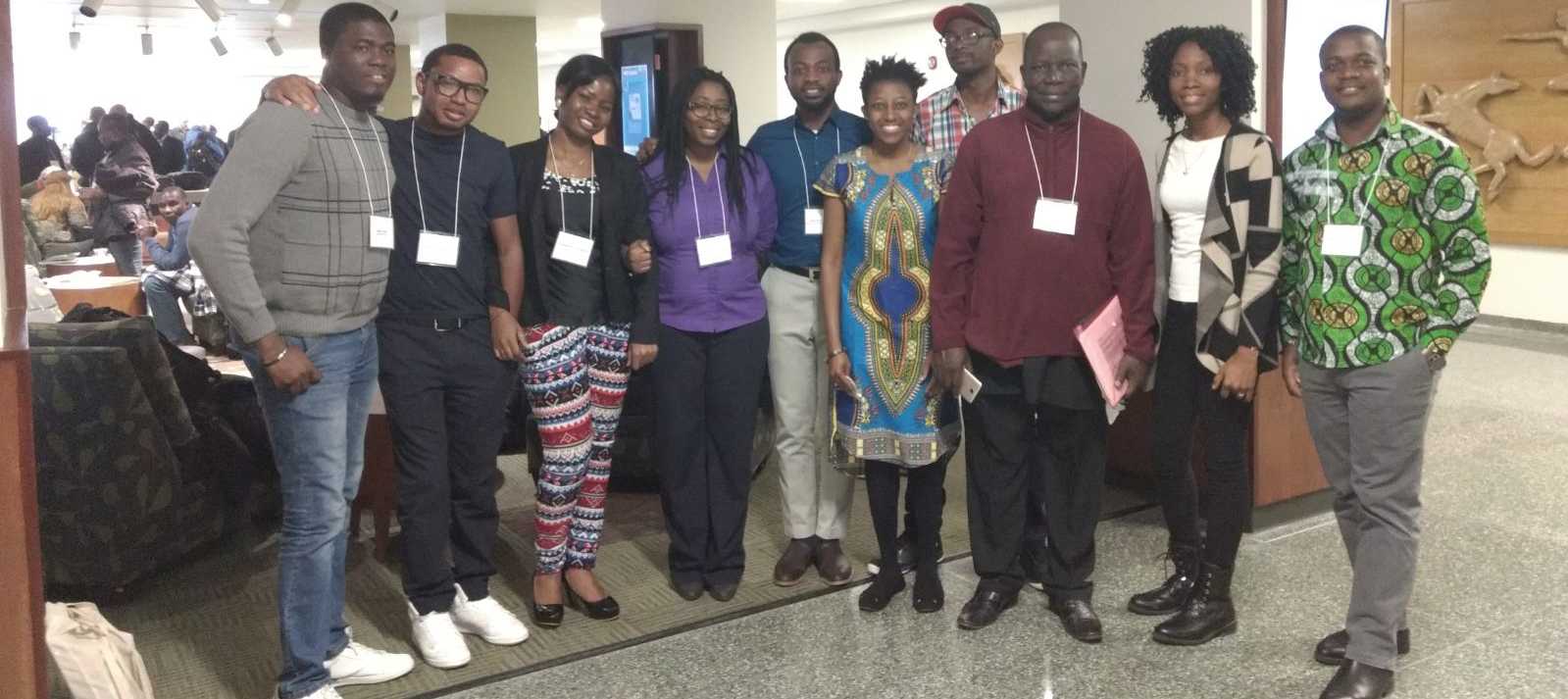Five graduate students in the Rhetoric, Theory and Culture program in the Department of Humanities gave presentations at the 49th Annual Conference on African Linguistics at the Michigan State University, East Lansing. The conference was held from Mar. 22 to 24. Participants came from universities in the United States, Canada, Italy, Japan, Austria, Ghana, Nigeria, Germany, Norway, the United Kingdom, South Africa, Kenya, Tanzania, Hong Kong, Cameroon, Australia, Finland, Sweden, Kuwait, Israel, Jordan, and the Democratic Republic of the Congo, among others.
The presenters from Michigan Tech were: Nancy Henaku, PhD candidate; Tolulope Odebunmi, PhD student; Edzordzi Agbozo, PhD student; Olayemi Awotayo, MSc candidate, and Linford Lamptey, MSc candidate.
Speaking on “Discourse, Power and Ideology in Female Political Self-Construction” Henaku examined speeches and interviews by Ghana’s first female presidential candidate, Nana Konadu Agyemang-Rawlings who has been popularly likened to Hillary Clinton. Henaku concluded her talk by saying that “Agyemang-Rawlings’ discourse provides significant insight into the complexity of female political power and the role of language in constructing this complexity.”
In a similar vein, Odebunmi discussed discourses around Liberia’s former president and Africa’s first female president Ellen Johnson-Sirleaf. She said there is a “subtle issue of power that is suppressed” in the discourses she examined from news outlets like Al-Jazeera.
Agbozo’s talk centered on how technology and capitalist economic models have expelled marginalized languages, such as the Ewe language of West Africa, from cyberspace and the heuristic techniques that speakers of such languages are using to negotiate this expulsion on Facebook. He concluded that globalization is inspiring linguistic creativity and that researches that cite globalization as a threat to languages may not be totally correct.
Discussing the linguistic strategies that politicians in Nigeria use to exclude and include people in their speeches, Awotayo called for a common ground in political discourse. As such, he suggested that political speech writers should acknowledge others’ contributions to the development of their countries.
Similarly, Lamptey interrogated a speech by a former Ghanaian president, John Dramani Mahama. He suggested that careful linguistic styles and rhetoric are not enough to win political power in Ghana. Rather, action and pragmatics are what citizens appreciate and as far as politicians offer them, they may find favor with citizens.
Since its establishment in 1970, the Annual Conference on African Linguistics has been held every year at various universities throughout North America. It has become, arguably, the largest gathering of scholars on African languages in the world. Its main mission is to advance and sustain the linguistic study of African languages.
Speaking to the Lode, Lamptey said “the conference offers opportunity for both academic growth and networking among linguistic scholars and people researching on Africa. I find the atmosphere uplifting. The work that other people are doing on languages are also inspiring.” Juliet Oppong-Asare Ansah, a professor at the Kwame Nkrumah University of Science and Technology in Ghana, and a participant at the conference also spoke to the Lode. She said “it is a great experience for me to meet the well-regarded academics in our field such as John Mugane from Harvard, Carol Myers-Scotton from Michigan State etc.”
The Michigan Tech participants were assisted with various forms of assistance from the Department of Humanities, the Center for Diversity and Inclusion and the Graduate Student Government. Professor of Linguistics in the Department of Humanities, Vicky Bergvall, also gave scholarly reviews to all the presentations before the presenters left for the conference.


